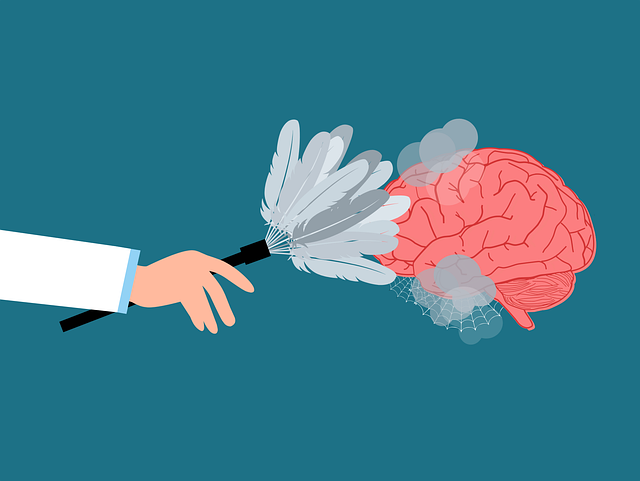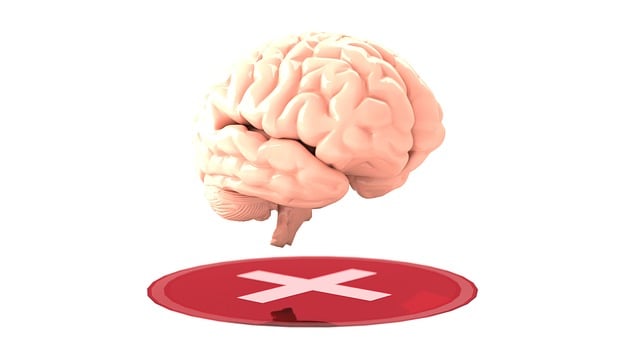Depression, a serious global concern, requires early intervention through recognition of red flags like persistent sadness, lost interests, and changes in appetite/sleep. Superior Functional Neurological Disorder (SFNDT) therapy addresses brain dysfunctions linked to depression using techniques such as neurofeedback and cognitive behavioral therapy (CBT). Lifestyle modifications, including exercise, healthy eating, journaling, and social skills training, target key aspects of SFNDT. Conflict resolution techniques integrated into mental health programs foster emotional well-being and resilience against future mood disorders. Mental wellness podcasts promote open conversations about mental health. SFNDT's holistic approach focuses on restructuring brain function and improving neural connectivity to prevent relapse.
Depression is a prevalent and profound mental health challenge, but it’s not insurmountable. This article delves into a multi-faceted approach to depression prevention, encompassing crucial aspects like understanding the condition, recognizing red flags, and exploring therapeutic interventions. We also shine a light on the neurological perspective, highlighting the brain’s role in mood regulation. Among the strategies discussed, Superior Functional Neurological Disorder Therapy emerges as a comprehensive, game-changing solution for managing and preventing depression.
- Understanding Depression: Recognizing the Red Flags
- Neurological Perspective: Unlocking the Brain's Role in Mood Regulation
- Therapeutic Interventions: Effective Treatments for Depression
- Lifestyle Modifications: Simple Yet Powerful Tools for Prevention
- Superior Functional Neurological Disorder Therapy: A Comprehensive Approach
Understanding Depression: Recognizing the Red Flags

Depression is a complex mental health disorder that affects millions worldwide, impacting one’s ability to feel joy and perform daily tasks. Understanding depression goes beyond the symptoms; it involves recognizing the underlying causes and red flags that may indicate a struggle with mental well-being. Early identification is crucial in preventing the condition from escalating into something more severe.
Red flags include persistent feelings of sadness or emptiness, loss of interest in activities once enjoyed, changes in appetite and sleep patterns, fatigue, difficulty concentrating, and thoughts of death or suicide. These signs often manifest gradually, making it essential to be vigilant. Individuals experiencing such symptoms should consider seeking professional help, especially if they impact daily functioning. Superior Functional Neurological Disorder Therapy offers effective strategies for managing depression by addressing underlying neurological imbalances. Additionally, organizations like Stress Management Workshops focus on empowering individuals with tools like conflict resolution techniques and emotional intelligence training, which can significantly contribute to preventive measures.
Neurological Perspective: Unlocking the Brain's Role in Mood Regulation

Depression prevention strategies often look beyond surface-level solutions by exploring the intricate relationship between our thoughts, emotions, and neural pathways. From a neurological perspective, understanding the brain’s role in mood regulation is key to developing effective strategies. Superior Functional Neurological Disorder Therapy (SFNDT) focuses on identifying and modifying these neural networks that contribute to depressive episodes. By addressing underlying neurobiological mechanisms, this approach offers a powerful tool in depression prevention.
Conflict resolution techniques, as part of mental health awareness programs, play a crucial role in this process. These techniques help individuals manage and resolve internal conflicts, which can be significant triggers for burnout and depression. Promoting healthy conflict resolution skills not only supports emotional well-being but also fosters resilience against future mood disorders. Additionally, cultivating mental health awareness encourages individuals to recognize early warning signs of depression, enabling timely intervention and prevention strategies such as burnout prevention initiatives.
Therapeutic Interventions: Effective Treatments for Depression

Depression prevention strategies often include a range of therapeutic interventions that have proven effective in treating this common mental health disorder. One such intervention is Superior Functional Neurological Disorder (SFND) therapy, which focuses on addressing underlying brain dysfunctions linked to depression. SFND techniques, including neurofeedback and cognitive behavioral therapy (CBT), aim to restore balance in the brain’s chemistry and neural activity. These approaches have shown remarkable success in helping individuals regain control over their moods and overall well-being.
Additionally, trauma support services play a crucial role in preventing depressive episodes, especially for those with a history of adverse life events or post-traumatic stress disorder (PTSD). Mental illness stigma reduction efforts are also vital to creating an environment where people feel comfortable seeking help. Engaging in mental wellness podcast series production can further support this cause by providing accessible information and sharing recovery stories, thus fostering open conversations about mental health.
Lifestyle Modifications: Simple Yet Powerful Tools for Prevention

Lifestyle modifications offer powerful yet often overlooked tools for preventing depression. Simple changes in daily routines can significantly impact mental health. Regular exercise, for instance, boosts mood by increasing brain regions associated with pleasure and relaxation, which is a key aspect of Superior Functional Neurological Disorder Therapy. Additionally, adopting healthy eating habits can influence neurotransmitter production, playing a crucial role in stabilizing one’s emotional state.
Beyond physical activities and diet, mental wellness practices like journaling and engaging in social skills training through podcasts or local groups foster resilience against depression. Journaling provides an outlet for processing emotions and thoughts, helping individuals gain perspective and identify potential triggers early on. Social connections are equally vital; they offer support networks that buffer the impact of stress and adversity, contributing to overall mental wellness.
Superior Functional Neurological Disorder Therapy: A Comprehensive Approach

Superior Functional Neurological Disorder Therapy offers a comprehensive approach to depression prevention by addressing the root causes and underlying mechanisms of mental health disorders. This therapy goes beyond symptom management by focusing on restructuring brain function and improving neural connectivity. It involves advanced techniques such as neurofeedback, which trains individuals to regulate their brain activity, leading to better emotional control and resilience.
By integrating Stress Reduction Methods, this therapeutic approach empowers individuals to develop inner strength and enhance their ability to cope with life’s challenges. Resilience Building is a key component, teaching practical strategies to navigate stress and adversity while fostering positive thinking and self-care habits. Ultimately, Superior Functional Neurological Disorder Therapy aims to equip individuals with the tools needed to build inner strength, prevent relapse, and cultivate lasting well-being.
In conclusion, depression prevention involves a multi-faceted approach that integrates understanding, neuroscience, therapy, and lifestyle modifications. By recognizing red flags early on and adopting simple yet powerful tools, individuals can effectively regulate mood and prevent the onset of depression. Furthermore, exploring innovative treatments like Superior Functional Neurological Disorder Therapy offers a comprehensive solution for managing and overcoming this complex condition. Armed with knowledge and accessible resources, folks can foster resilience and lead indelible lives free from the shackles of depression.













